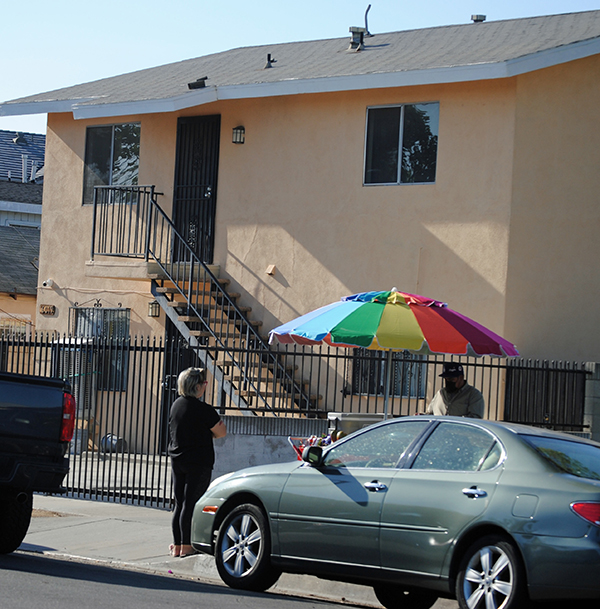By Alfredo Santana
Contributing Writer
BELL GARDENS — The city abruptly canceled its city council meeting July 25 where elected officials were scheduled to discuss caps on annual rents and approve permanent rent controls in a city where 78% of its residents are tenants.
A city employee said the meeting was canceled due to lack of quorum.
Previously, the council adopted a 90-day rent freeze extension to an ordinance enacted on April to allow lawyers from the Legal Aid Foundation of Los Angeles and members from an ad-hoc committee more time to review a permanent rent control draft.
The City Council voted 5-0 in favor of the extension at its regular meeting on July 11.
The temporary ordinance took effect on July 24, and is expected to expire Oct. 9, with the caveat that the council may vote to extend it again unless staff submits a final draft before the expiration date.
A city document indicated the council was prepared to vote on an amendment to either allow a 3% annual rent increase but capped at 5% with inflation, whichever was less, or on a 3% rent hike plus inflation as defined by the consumer price index at a maximum of 8%, whichever was lower.
Currently, state law permits rent increases of 5% a year plus another 5% to make up for high inflation for a total of 10%.
The U.S. Labor Department reported that the region including Los Angeles and Orange counties experienced an 8.6% rise on prices in June compared to last year.
However, tenants and social workers in favor of the ordinance alleged property owners are not following the rent freeze, since the first of two temporary ordinances was adopted on April 25.
Before the council canceled this week’s meeting, city documents indicated the extension gave staff time to gather feedback from the ad-hoc committee, assembled to study the potential impact of the permanent rent control law, and from the nonprofit Legal Aid Foundation of Los Angeles, which was tasked with reviewing the draft before it was submitted to a vote.
At the July 11 City Council meeting, Community Development Director Gustavo Romo said staff planned to incorporate comments from both Legal Aid Foundation and the ad-hoc committee to the final ordinance when it was ready.
Romo said city staff also received comments from the Apartment Association of Greater Los Angeles, a nonprofit group representing apartment owners that is generally against rent controls, and from other agencies.
“There are a lot of comments on this ordinance, and ultimately we expect that there’ll be both parties from the landlords side and the tenants side identifying different provisions that are needed for this ordinance,” Romo said.
Enlisted in the ad-hoc committee are two tenants, two landlords, two City Council members and a representative from a charity organization. Starting last December, the committee has held several public workshops on the rent control program and provided legal contacts to renters seeking to address housing problems.
The ad-hoc committee met in May, June and July to discuss the draft’s tenants protections and terms of what constitutes just cause evictions.
It is expected that the City Council will take on the so-called rent stabilization ordinance at its next meeting Aug. 8.
If approved, the rent control ordinance would exclude units, condominiums and properties built after 1975, in line with the state’s Costa-Hawkins Rental Housing Act.
The rental freeze extension does not apply to motels, hotels, inns and rooming or boarding houses if the accommodations are not leased to the same tenant for 30 or more days.
In previous meetings, lawyers working with city attorneys said that rent control laws are legal so long as they provide landlords the ability to receive fair rental returns, thus clearing potential constitutional challenges.
A report prepared by Romo indicated that data from the city’s Housing Element of 2019-2021 shows that 58% of households in Bell Gardens spend more than 30% of their income on housing, while 28% spent at least half of their income on rent.
“Rents in the city and throughout Los Angeles County continue to rise, and although the city has lower rents relative to surrounding communities, many local residents, particularly low-income households, struggle with paying for rising housing costs and meeting other basic needs such as food, transportation and health care,” the report said.
The 2018 American Community Survey indicated that the median contract cost for rent in Bell Gardens was $1,190 a month, while the Housing Element set monthly one-bedrooms apartments at between $932 and $979.
Two-bedroom units fluctuated from $1,175 to $1,800, and three bedroom condominiums pulled $2,675 a month.
Lucia Veloz, a member of the Bell Gardens Neighbors Union, urged the City Council to fight back against predator landlords who bully tenants who have nowhere else to go.
“I visited old and new tenants and they are worried because landlords are not considering the rent freeze,” Veloz said. “They don’t care that the city has adopted this measure.”
Monica Aguilar, a UCLA graduate student from the Jonathan and Karin Fielding School of Public Health, linked the poor health of some residents to stressors traced to climbing housing rents.
Aguilar called in to support tenants rights and the proposed rent control ordinance, a measure she said would bring economic stability and provide safety to low income renters impacted by health and economic conditions wrought by COVID-19.
“Residents in Bell Gardens continue to report rent increases, evictions and displacements from landlords, which has led to many poor health outcomes,” Aguilar said. “When rents are unaffordable, residents are forced to decide whether checks go to buy food, medication, child care or rent. They should not have to be doing this.”
On the other side, mom and pop landlords and representatives from real estate companies with portfolios of multi-housing apartments are pushing back, citing high inflation as the main driver of rising maintenance costs plus dragging labor and scarcity of supplies blamed on the coronavirus pandemic.
Daniela Leider-Peretz, director of government affairs and external relations for the Apartment Association of Greater Los Angeles, said her group sent a letter to the council expressing its opposition in detail to the rent control ordinance.
Before the canceled council meeting, Leider-Peretz said the city had not presented reliable data indicating a housing affordability crisis that merited the passage of an emergency rent control ordinance.
She said that small landlords are the first in line to sell their properties to large corporations in the real estate industry when they struggle to recoup investments to upgrade and comply with housing codes.
“We ask the City Council to provide equal opportunity to the representatives of the multi-family rental housing industry and all stakeholders in giving them an opportunity to review and provide feedback on the draft ordinance before it’s presented to council for a vote,” Leider-Peretz said.












